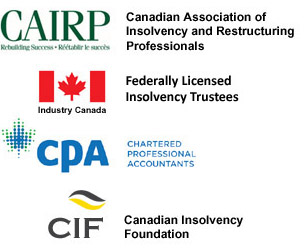Bankruptcy and Insolvency Law
INSOLVENCY LAW IS FEDERAL LAW
In Canada, Insolvency Law and the rules governing bankruptcy are set out in the Bankruptcy and Insolvency Act of Canada. The Bankruptcy and Insolvency Act is a federal law which regulates bankruptcy and proposal proceedings in Canada and as a federal law, it applies to all provinces and all three territories.
Insolvency Law is overseen by the Superintendent of Bankruptcy, a federally appointed government official who oversees the Insolvency Division of Industry Canada, one of the departments in the Government of Canada.
WHO ADMINISTERS INSOLVENCY LAW?
A Licensed Insolvency Trustee is a person licensed by the Superintendent of Bankruptcy to administer bankruptcies and proposals under Canadian federal law. Licensed Insolvency Trustees are not Bankruptcy lawyers, and for the most part, are professional accountants with a professional designation as a chartered accountant or a certified management account and/or they have earned a further designation as a Canadian Insolvency and Restructuring Professional. Symbols representative of these designations, which evidence a invsolvency trustee’s qualifications, are shown at the bottom of this webpage.
SOME PROVINCIAL LAWS MAY APPLY
The Bankruptcy and Insolvency Act allows certain provincial laws to apply. The provincial law relevant to most people considering bankruptcy or consumer proposal is the exemptions law applicable to their province of residence. Section 67 of the Federal Bankruptcy and Insolvency Act allows each province to set its own law, with respect to determining what is exempt from seizure and what assets its residents can keep. In Alberta the provincial law governing exemptions is called the Civil Enforcement Act of Alberta. Excerpts therefrom and a summary detailing what can be kept if you file bankruptcy or consumer proposal in Alberta is available on our Alberta Insolvency Exemptions Law page.
These exemptions may not apply if you have pledged or given security against any of the otherwise exempt assets you own, to a secured creditor. A secured creditor is not prevented from exercising its rights of repossession against any assets you have pledged and a secured creditor’s rights and actions are governed by provincial law. For a description of the different types of debt and how they are treated, please feel free to access our webpage entitled Types of Debt.
For a free confidential, no-obligation assessment of your financial situation and review of the Insolvency laws relevant to you, please feel free to contact a Consumer Proposal Administrator.
BANKRUPTCY AND INSOLVENCY ACT – WHERE CAN I FIND IT?
For more complete information about bankruptcy law and insolvency or proposal law in Canada, readers of this webpage are directed to:
Bankruptcy and Insolvency Act of Canada
Content is released under the CC-BY-SA 3.0 license.
Send us an Email, Ask us a Question, Have us Call You!

